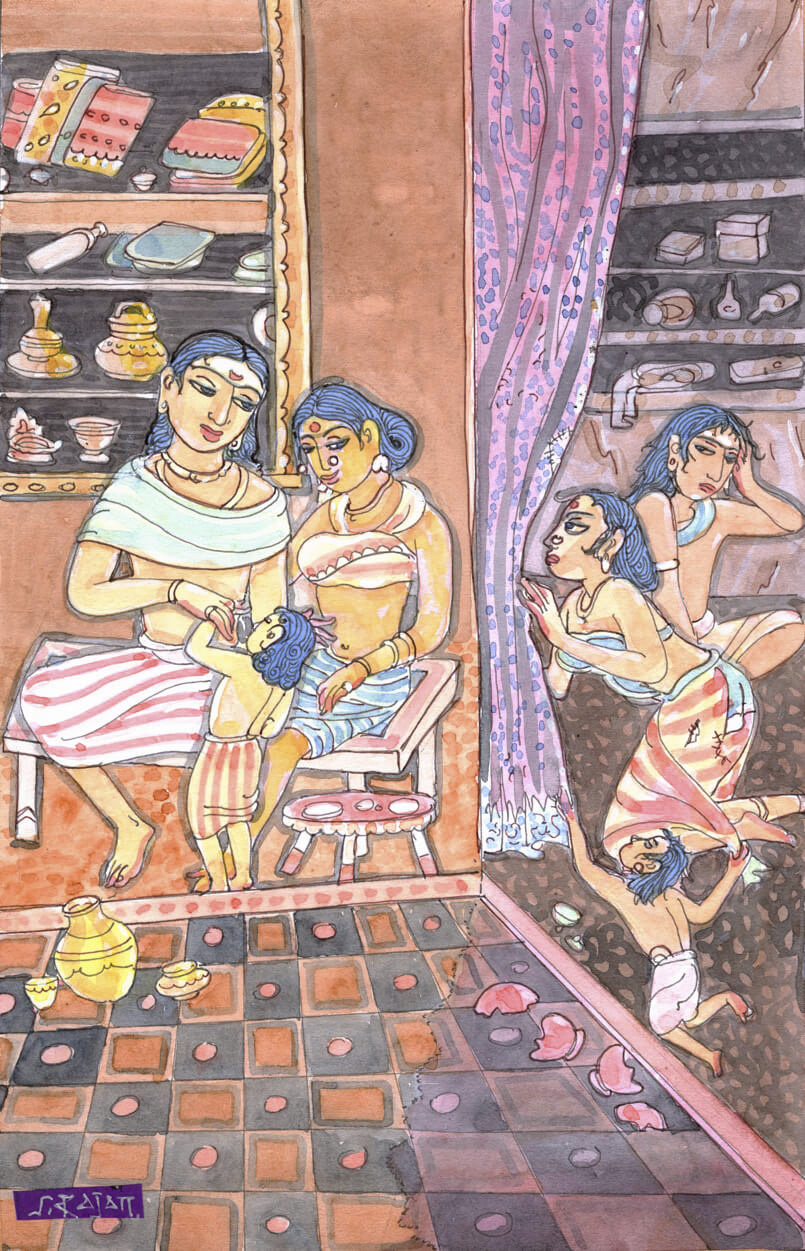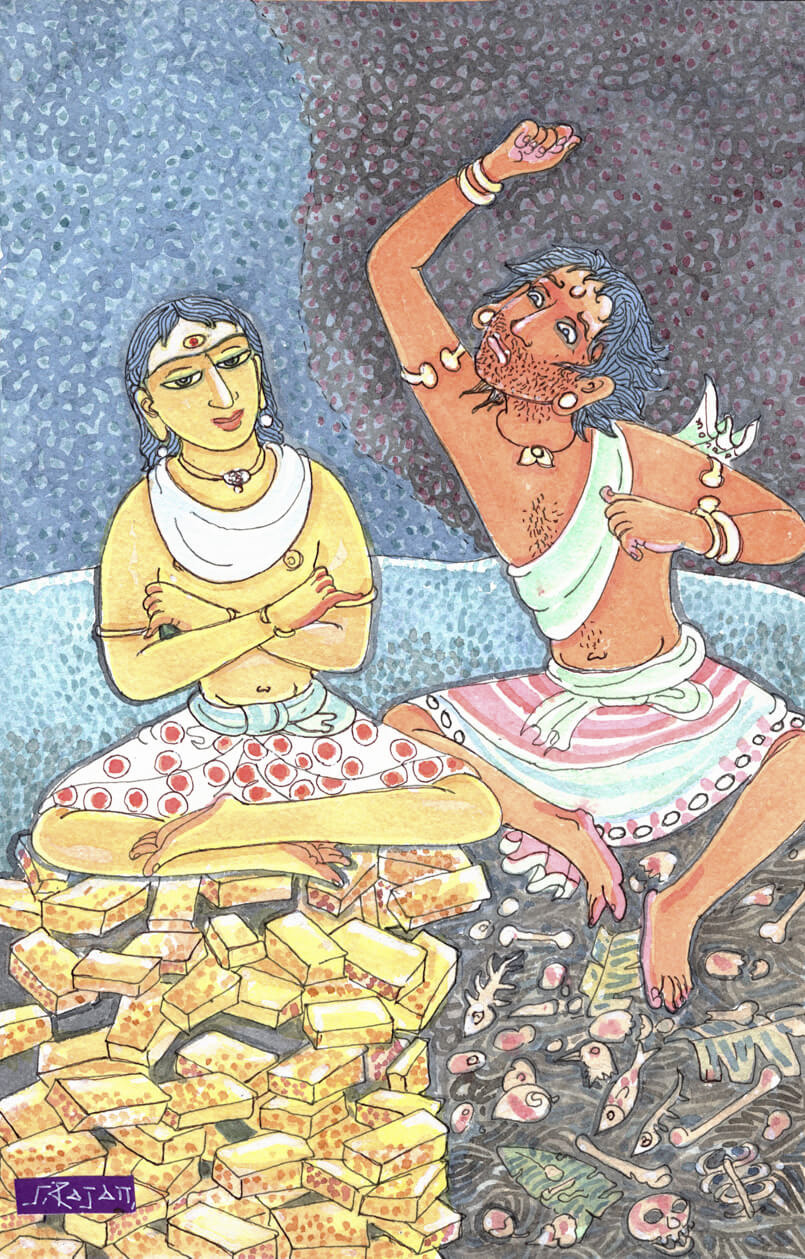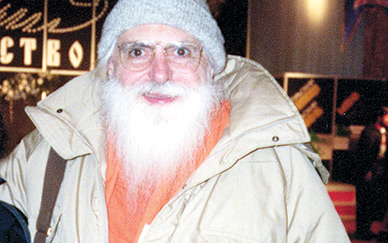Our First Chitra Puja of 2021!

Jai Gurudeva!
Recently our monks celebrated our January chitra nakshatra with their monthly padapuja to Gurudeva. Yogis Haranandinatha and Jayanatha performed the short abhishekam. Satguru Bodhinatha Veylanswami and other monks attended for this evening worship, invoking the love and blessings of Gurudeva. Aum.
"Understanding, loving and making allowances--these are the strengths of the soul awakened through sadhana, once the emotional ups and downs and the barriers of the instinctive influences of fear, jealousy, anger, deceit and disappointment are conquered" - Gurudeva
The Concept of Awareness – Part One
Satguru Bodhinatha Veylaswami gives an upadesha on the concept of awareness from the yogic perspective.
Consciousness and awareness are the same when awareness is totally identified with and attached to that which it is aware of. To separate the two is the artful practice of yoga. Naturally, the Shūm-Tyeīf language is needed to accomplish this. When awareness is detached from that which it is aware of, it flows freely in consciousness. A tree has consciousness. Awareness can flow into the tree and become aware of the consciousness of the tree. Consciousness and mind are totally equated as a one thing when awareness and consciousness are a one thing to the individual. But when awareness is detached from that which it is aware of, it can flow freely through all five states of mind and all areas of consciousness, such as plants and the Earth itself, elements and various other aspects of matter. Here we find awareness separate from consciousness and consciousness separate from the five states of mind attributed to the human being. In Sanskrit we have the word chaitanya for consciousness, and for awareness it is sākshin, meaning witness, and for mind the word is chitta. Consciousness, mind, matter and awareness experience a oneness in being for those who think that they are their physical body, who are convinced that when the body ends, they end and are no more. ¶We have three eyes. We see with our physical eyes and then we think about what we have seen. Going into meditation, we see with our third eye our thoughts. Then we choose one or two of them and think about them and lose the value of the meditation. It is the control of the breath that controls the thoughts that emerge from the subconscious memory patterns. Once this is accomplished, and the iḍā, piṅgalā and sushumṇā merge, we are seeing with the third eye, which is the eye of awareness, wherever we travel through the mind, inside or outside of our own self. ¶The minute awareness is attached to that which it is aware of, we begin thinking about what we were aware of. Controlling the breath again detaches awareness, and it flows to another area of the mind, as directed by our innate intelligence, this intangible superconscious, intelligent being of ourselves that looks out through the eye of awareness in a similar way as do the two eyes of the physical body. This then divides what we are aware of and thinking of what we were aware of, or distinguishes the process of thinking from that of seeing during meditation. ¶Awareness travels into the wonderful strata of thought, where thought actually exists in all of its refined states. First in these strata of thought is an area where ideas are only in a partial, overall, conceptual stage. Deeper into this stratum, they, as concepts, become stronger and stronger until finally they almost take physical form. Finally, they do take physical form. But you are the pure, individual awareness, the ball of seeing light that is seeing all of this occur within these strata of mind and not identifying too closely with them. The quest is to keep traveling through the mind to the ultimate goal, merging with Śiva. When you are conscious that you are awareness, you are a free awareness, a liberated soul. You can go anyplace in the mind that you wish. ¶The mission is: don’t go anyplace. Turn awareness back in on itself and simply be aware that you are aware. Try to penetrate the core of existence. Become conscious of energy within the physical body and the inner bodies, flowing out through the nerve system and drawing forth energy from the central source of the universe itself. Now try to throw awareness into this central source of energy and dive deeper and deeper in. Each time you become aware of something in the energy realm, be aware of being aware. Finally, you go beyond light. Finally, you go into the core of existence itself, the Self God, beyond the stillness of the inner areas of mind. That is the mission and that is what humanity is seeking—total Self-God Realization.
A New Sight at the Monastery Entrance

Aum Namah Sivaya
Recently we installed a granite replica of the amazing Iraivan Temple Crystal Sivalingam. This carving was sent to us along with a previous shipment of temple stones. The Lingam used to be displayed at the carving site in Bengaluru where the silpis could perform a puja to it before beginning work on their sacred task for the day. For several years it has sat next to Iraivan Temple, waiting for a good place to be moved to. The eventual goal is to have it placed at the future Visitors' Center. For now it has been placed next to the monastery entrance where all visitors can see it and get an understanding of the size and shape of the real crystal that is nearby in Kadavul Temple. Om.
Tirukural – Chapter 17

Chapter 17: Avoidance of Envy

Verse 166
There is a room filled with beautiful objects and in it a family finds contentment. In the adjoining apartment an impoverished woman is hiding behind the curtain, envious of her neighbors. Her husband has his hand on his head to indicate suffering and the children are pulling at her clothes.
You can access the entire text, in Tamil and English here:
Weaver's Wisdom
Verse 161
The unenvious heart is to be valued
no less than virtuous conduct itself.
Verse 162
Among the many precious things a man may acquire,
none surpasses a nature free from envy toward all.
Verse 163
They say he who is jealous instead of joyous of another's wealth
clearly desires no wealth or virtue of his own.
Verse 164
Envy will never cause one to commit wrongful deeds
who rightly fathoms the disgrace that follows.
Verse 165
A man's own envy is foe enough to forge his ruin,
even if he has no other enemies.
Verse 166
Whoever begrudges another's bounty will watch
his kindred die in poverty, naked and starving.
Verse 167
Goddess Fortune, intolerant of those who cannot tolerate others'
success, introduces them to her sister, Misfortune, and goes away.
Verse 168
The wicked one called Envy consumes this world's wealth,
then consigns sinners to those worlds of hellish fire.
Verse 169
It is worth pondering why good men may be poor
while the envious in heart can prosper.
Verse 170
There are no envious men who have risen to prosperity.
There are no men free from envy who have fallen from it.
Celebrating a Successful Digital Dharma Drive!!!

Jai Ganesha!
Our deepest gratitude to all of our 2020 Digital Dharma Drive Donors. With your help, we reached our $75,000 goal and then went on by December 31st to surpass it by over $57,000! This spirited support will assure that we can continue to inspire, create and renovate a deluge of digital content. We will redouble our effort of bringing Hinduism forward into the information age through our websites, mobile apps, web apps, translations, learning courses, kids' learning resources, digitized books and more. With your help our small team of media-minded monastics can do even more in 2021, whether it be hiring new translators, engaging more coders, commissioning spiritual art, building new sites and apps, or utilizing better plugins and programs to make our work more efficient. Below we'd like to share several comments from this year's donors. Your inspiration adds to our inspiration, by which we hope to inspire even more. It also makes us blush.
"I am 26 years old. After more than a decade of active searching, I have finally found the answers to life that I am looking for. Words are not enough to describe my gratitude. Thank you!"
"Great teachings (lots of it!) to learn and absorb and put into life... Living a purposeful life thanks to Satguru's teachings."
"Mikka Nandri. I am so grateful for Nandinatha Sampradaya. The quality and vastness of your resources are just so incredible and enduring. Your message is needed more than ever."
"I have stopped counting how many of my questions have been answered by daily lesson series. It's been the third year for me of rereading this writing and I can't get enough."
"This is important to me because the tools on the Himalayanacademy.com website changed my life for the better."
"I have grown tremendously both Spiritually and as a “worldly human being” by reading, understanding, and reflecting on the insightful, inspiring, and illuminating articles and books published here."
"Thank you sincerely for the resources you've provided for free. I hope this donation will help spread Hindu dharma across the world."
"I found answers to spiritual questions I'd had from your resources. Pranams to your lineage. I plan to read your master trilogy in the next three years and got some of my family to start reading it."
"Hinduism Today is a beautiful spiritual treasure that helps us stay grounded"
"I never found a conception of God I could believe in until I found your lessons online. Thank you! I hope you continue to keep reaching people like me through your work online."
"You are changing the world by educating people about our great religion, Hinduism. Thank you so much for spreading Hinduism around the world."
"Uplifting and educational content conveyed with brilliant simplicity and grace. The love, effort and blessings of the monks are apparent."
"You are doing a great service of taking Sanatana Dharma to the future generations! I would like to be a part of your great service! Thank you!"
"I am ever so grateful for all the content I find here which inspires and keeps me in awe. Thank you for making it all possible."
"Mahalo to Satguru, Paramacharyas, Swamis, Yogis and All who so brilliantly help and uplift this world."
2020 Ardra Darshanam Homa

Aum Namah Sivaya
On December 29th, the monks of Kauai Aadheenam celebrated Ardra Darshanam with an early-morning homa, followed by an abhishakam to Lord Nataraja, concluding at noon that day. This day is considered one of the most auspicious days of the year, with Siva's dancing star of Ardra being in alignment with our moon, the Earth and the Sun. It is a time when we worship Siva in divine form, as opposed to Mahasivaratri, when we try to realize Siva as our own formless perfection. Aum
The Seven Dimensions of the Mind – The First Dimension
Satguru Bodhinatha Veylanswami gives his weekly Upadesha in Kadavul Temple at Kauai Aadheenam. Here, Satguru continues his discussion of Sivaya Subramuniyaswami's writings about the seven dimensions of the mind with an explanation of the first dimension.
News from Mauritius

At the Spiritual Park in Mauritius, members have recently received delivery of a massive wooden frame holding a life-sized photo of Gurudeva holding a bamboo danda and wearing his wooden tiruvadi sandals. It is to be installed in one of the new mandapams in the days ahead, to inform the thousands of visitors who come each month of the founder and offer them a glimpse, a darshan. The craftsmen carved Shum mamsane into the oak wood and balawo frames. Congratulations to the team for pushing through this wonderful addition to the Spiritual Park.
Tirukural – Chapter 16

Chapter 16: Possession of Forbearance

Verse 155
An angry man, surrounded by filth, is about to strike another man who remains calm. The victim, refusing to retaliate, is sitting on a pile of gold bricks.
You can access the entire text, in Tamil and English here:
Weaver's Wisdom
Verse 151
Just as the Earth bears those who dig into her,
it is best to bear with those who despise us.
Verse 152
It is always good to endure injuries done to you,
but to forget them is even better.
Verse 153
It is impoverished poverty to be inhospitable to guests.
It is stalwart strength to be patient with fools.
Verse 154
Desiring that greatness should never cease,
let one's conduct foster forbearance.
Verse 155
Worthless are those who injure others vengefully,
while those who stoically endure are like stored gold.
Verse 156
The joy of the vengeful lasts only for a day,
but the glory of the forbearing lasts until the end of time.
Verse 157
Though unjustly aggrieved, it is best to suffer the suffering
and refrain from unrighteous retaliation.
Verse 158
Let a man conquer by forbearance
those who in their arrogance have wronged him.
Verse 159
Those who patiently endure rude remarks
possess the rare purity of an ascetic.
Verse 160
Great are those who suffer fasting's hardships; yet they
are surpassed by those who suffer hard words.
A Gift on Canvas
Om Namah Sivaya
Today the monks received a gift from Natalie Levin. As you may know, this Arizona-based artist has created a collection of sketches, each of which captures a different fragment of Gurudeva's potent spirit (You can see them all here). This special gift is one of those sketches, having been enlarged and printed on canvas. The monks of the Ganapati Kulam hung it on the wall of the Media Studio, and it fits the space perfectly. Jai Gurudeva!
From Our Gurus' Teachings
Archives are now available through 2001. Light colored days have no posts. 1998-2001 coming later.

